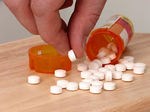Residents throughout Prairie North Health Region (PNHR) have the opportunity Nov. 1 - 30 to participate in a region-wide medication roundup. The month-long program is being expanded this year to cover the entire region.
The medication roundup is an initiative of PNHR's Population Health Promotion Unit, in collaboration with Mental Health and Addiction Services in Prairie North, Battlefords Family Health Centre in North Battleford and pharmacies in communities across the region.
Anne Duriez, of the PNHR Population Health Promotion Unit, encourages individuals and families to gather up unused or expired prescription medications or oral over-the-counter medications they have in their home, and take the items to the local pharmacy for free, safe disposal. Disposal of needles, syringes, blood glucose test strips, lancets or other sharps may also be available at local pharmacies. Residents are advised to check with their pharmacist for the store's policy on disposal of such items.
Duriez notes that in addition to the November medication roundup blitz, free medication disposal services are available to pharmacy patrons year round.
"Clearing out and properly disposing of unused or expired medications is a matter of safety," Duriez says.
"When improperly stored, unused, or expired medication accumulates in the home, there is an increased likelihood that the medication will be taken after it is expired, or by someone for whom it was not prescribed. Children or pets may also accidentally consume the items, resulting in harmful effects."
Citing a 2012 Canadian Center on Substance Abuse report, Tyler Aiken, an addictions counsellor with Mental Health and Addiction Services in Meadow Lake, reminds people that "in terms of potential for misuse, the most problematic prescription drugs in Canada are opioids, stimulants and sedatives."
He explains, "Opioids are the third most commonly abused substance among youth in Canada. Young people are most likely to have their first experience with prescription drugs recreationally. Sixty-seven per cent of youth indicate that they obtained those prescription medications at home."
"Unsafe storage of medications in the home is one of the ways that prescription medications can be diverted from their intended medical purpose. The person for whom the medication was prescribed may be unaware that someone else is using their medications," Aiken adds.
Duriez states, "The best way to ensure that medications are not accidentally ingested, or do not fall into the hands of people who could abuse them, is to take your medications as prescribed and, if you don't finish your medications, to properly dispose of them.
"The same is true of over-the-counter medications. Either can lead to poisonings, addictions or other harms. While people cannot necessarily avoid being prescribed medications that could be harmful when not taken as prescribed, safely disposing of unused medication is one way to help reduce the likelihood that misuse or poisoning can happen," she adds.
According to a PNHR press release, the medication roundup initiative is intended to raise awareness of the hazards of keeping unused or expired medications in the home, and of the benefits of regularly taking unused mediations to the pharmacy for disposal. The free, safe disposal of medications offered by local pharmacies is an important part of improving medication safety in the home and community, the release states.
November was chosen for Prairie North's Medication Roundup to help highlight National Addictions Awareness Week, and focus on the potential link between prescription drugs and addictions.
If you or someone you know is being affected by misuse of prescription or over-the-counter medications, you are encouraged to contact PNHR Mental Health and Addiction Services for support: Lloydminster 306-820-6250; Meadow Lake 306-236-1580; or North Battleford 306-446-6500.




